Causes of falling blood sugar levels. Low blood sugar: causes and symptoms
Low sugar in the blood is a common problem faced by people of all genders and ages. A short-term drop in glucose levels is considered quite normal occurrence associated with the consumption of certain foods or physical activity. But if hypoglycemia is constant, then this is already a cause for concern.
why is this dangerous?
It's no secret that glucose is the main source of energy for the body. In particular, the headache can only work when there is a sufficient amount of sugar in the blood. When its quantity decreases, it is disrupted normal operation nervous system. For example, with a severe lack of glucose, the brain simply shuts down, causing a person to lose consciousness. And long-term sugar deficiency leads to gradual, but, unfortunately, irreversible damage to the nervous system.
Chronic hypoglycemia affects the functioning of the entire body, in particular, serious disturbances in normal metabolism are observed.
As mentioned above, low blood sugar can be the result of physical or nervous overstrain when the body uses up the received glucose too quickly. Glucose deficiency can also be caused by a lack of this substance in food, which often happens with strict diets or fasting. In addition, there are various herbs and fruits that lower blood sugar. For example, using large quantity tangerines, apricots, plums, apples, blueberries, almonds, cinnamon can lead to the development of hypoglycemia. But what to do if the decrease in glucose levels is not associated with either diet or physical activity?
Low blood sugar: main causes

Yes, hypoglycemia - serious reason for concern. After all similar condition may indicate a host of disorders and diseases.
- In some cases, a decrease in glucose levels is associated with taking certain medicines, for example, products containing amphetamines.
- In addition, hypoglycemia may indicate illness gastrointestinal tract which are accompanied by impaired absorption of carbohydrates in the intestine.
- Quite often the cause is a pancreatic tumor, the growth of which is accompanied by an increase in the level of secreted insulin.
- And, of course, in patients with diabetes, glucose deficiency can be caused by an overdose of insulin.
Reduced level blood sugar: main symptoms

In fact, hypoglycemia is accompanied by a number of characteristic symptoms, the intensity of which depends on the level of glucose drop. In particular, symptoms include:
- Constant chronic fatigue.
- A person cannot get enough sleep and suffers from constant bouts of drowsiness throughout the day.
- Symptoms include lethargy, lethargy, and difficulty concentrating.
- Dizziness - enough common problem in patients, especially if they do not have the opportunity to eat on time.
- As already mentioned, with a sharp decrease in sugar, loss of consciousness is possible.
In any case, if you have such alarming signs, you should consult a doctor and take a blood test. Only laboratory test will help determine your glucose level.
The article describes the symptoms and treatment of increased and low sugar in blood.
how it makes him more active and resilient, increases his strength. However, it is necessary to monitor glucose levels, as fluctuations can lead to undesirable, and sometimes very serious, consequences.
Normal blood glucose level
normal blood glucoseGlucose for human body considered sugar dissolved in the blood, with the help of which the correct carbohydrate metabolism. Glucose enters the blood from the liver and intestines. In order for human cells to absorb glucose, the hormone insulin is required. It is produced by the pancreas. If there is little insulin in the blood, type 1 diabetes occurs, if insulin has a weak effect, then type 2 diabetes (90% of cases).
Blood glucose levels should be kept within normal limits. If a person’s glucose level is disturbed in the direction of increasing (hyperglycemia) or decreasing (hypoglycemia), this leads to the development serious complications. For example, when increased content blood sugar (hyperglycemia) causes diabetic neuropathy - nerve damage. Pain in the legs, a burning sensation, “pins and needles”, and numbness appear. IN severe cases may arise trophic ulcers, gangrene of the limb.
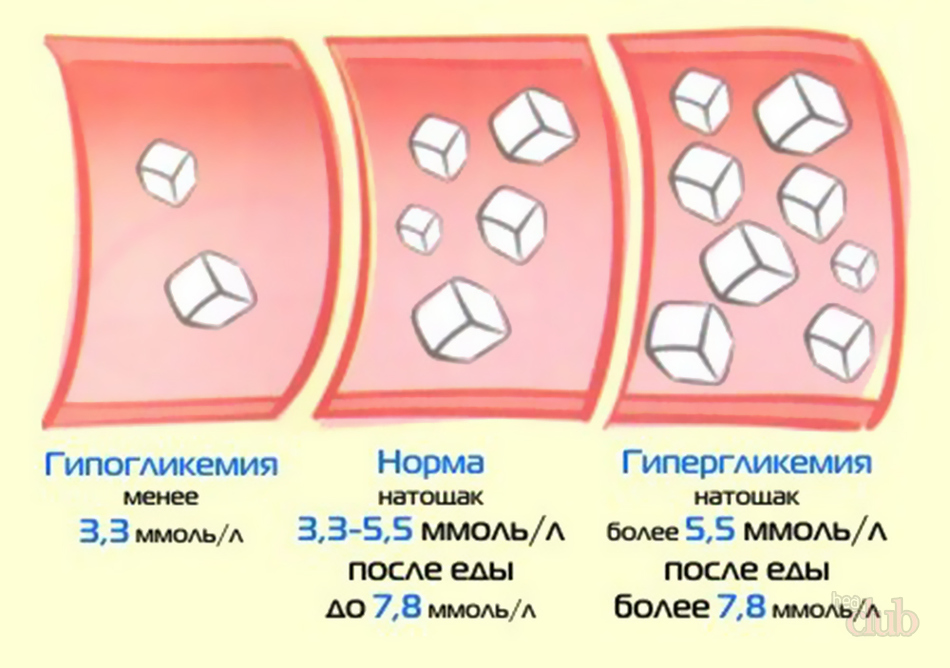 blood sugar levels
blood sugar levels Increased blood sugar
In a person on an empty stomach, the minimum amount of sugar in the blood is determined. After eating, food is digested and nutrients enter the blood. Therefore, after eating, the amount of sugar in the blood increases. This increase in sugar is small and does not last long. This occurs provided that the functions of the pancreas are not impaired, carbohydrate metabolism is correct and additional insulin is released, which lowers blood sugar.
If there is not enough insulin ( diabetes type 1) or it has a weak effect (type 2 diabetes), then blood sugar rises for a long time after eating. It affects the kidneys, nervous system, on vision, a heart attack or stroke may occur.
The reasons for high blood sugar can be not only diabetes, but also:
- nervous stress
- infectious diseases
- dysfunction of the adrenal glands, pituitary gland
- long-term use of medications, etc.
Signs and symptoms of high blood sugar
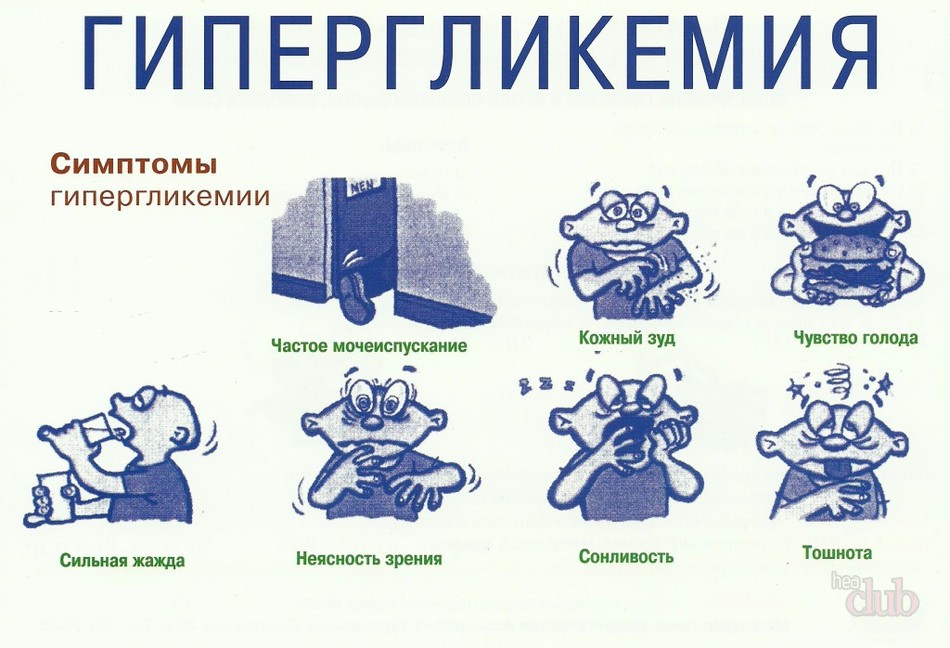 symptoms of hyperglycemia
symptoms of hyperglycemia The main sign of increased blood sugar is thirst, and severe thirst, which is accompanied by dry mouth. At high sugar nerves are affected and doctors call this condition neuropathy. Pain in the legs, weakness, burning sensation, “pins and needles”, numbness appear. In severe cases, trophic ulcers and gangrene of the extremities may occur.
Low blood sugar
Most people experience an increase in blood glucose. However, common serious illness There is also a decrease in blood sugar - this is below 4 mmol/l. In diabetes, a sharp drop in blood sugar is dangerous, which can cause serious consequences. Low blood sugar is more common in obese people who are obese and have an unhealthy diet. For such people it is necessary to establish correct image life and proper nutrition.
Signs and symptoms of low blood sugar
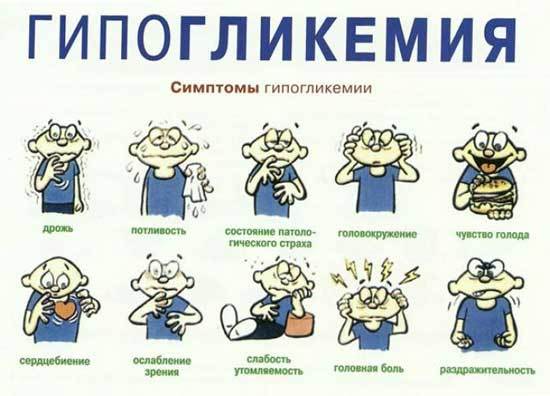 symptoms of hypoglycemia
symptoms of hypoglycemia The main symptoms of low sugar are:
- headache
- constant fatigue
- anxiety
- hunger
- increased heart rate (tachycardia)
- blurred vision
- sweating
With a sharp drop in sugar, a person may lose consciousness or experience such inappropriate behavior, which is typical for alcohol or drug intoxication. If insulin is used, low blood sugar may occur at night ( nocturnal hypoglycemia), which is accompanied by sleep disturbances and heavy sweating. If blood sugar drops to 30 mg/dL, coma, seizures, and death may occur.
How to determine the exact level of glucose in the blood?
You can donate blood to check your blood sugar levels in the hospital in the morning on an empty stomach from your finger (capillary blood).
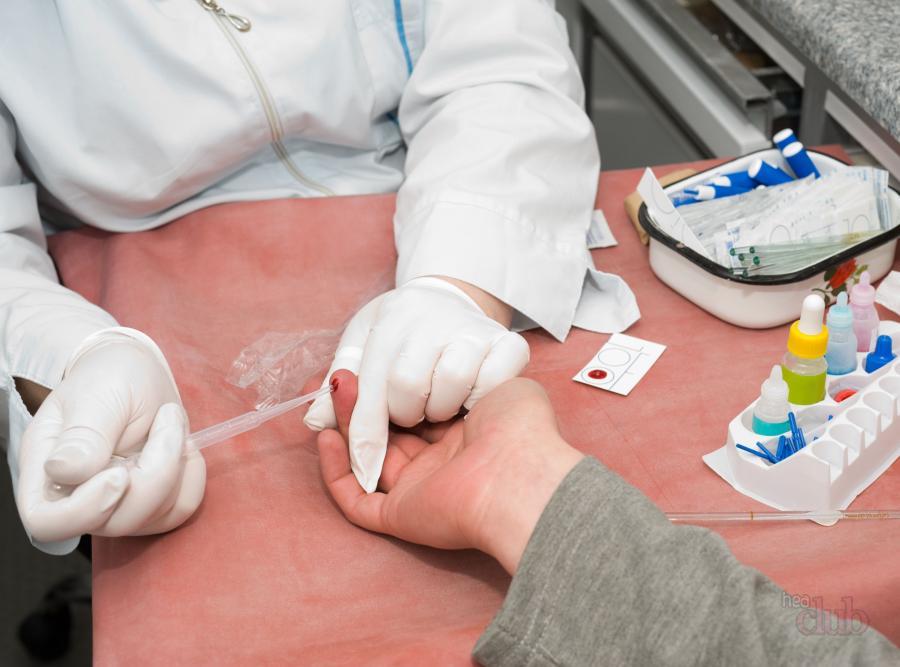 drawing blood for analysis
drawing blood for analysis To ensure the reliability of a blood glucose test, an oral method is used. glucose tolerance test. This method consists of asking the patient to drink glucose (75 g) dissolved in water and after 2 hours blood is taken for analysis.
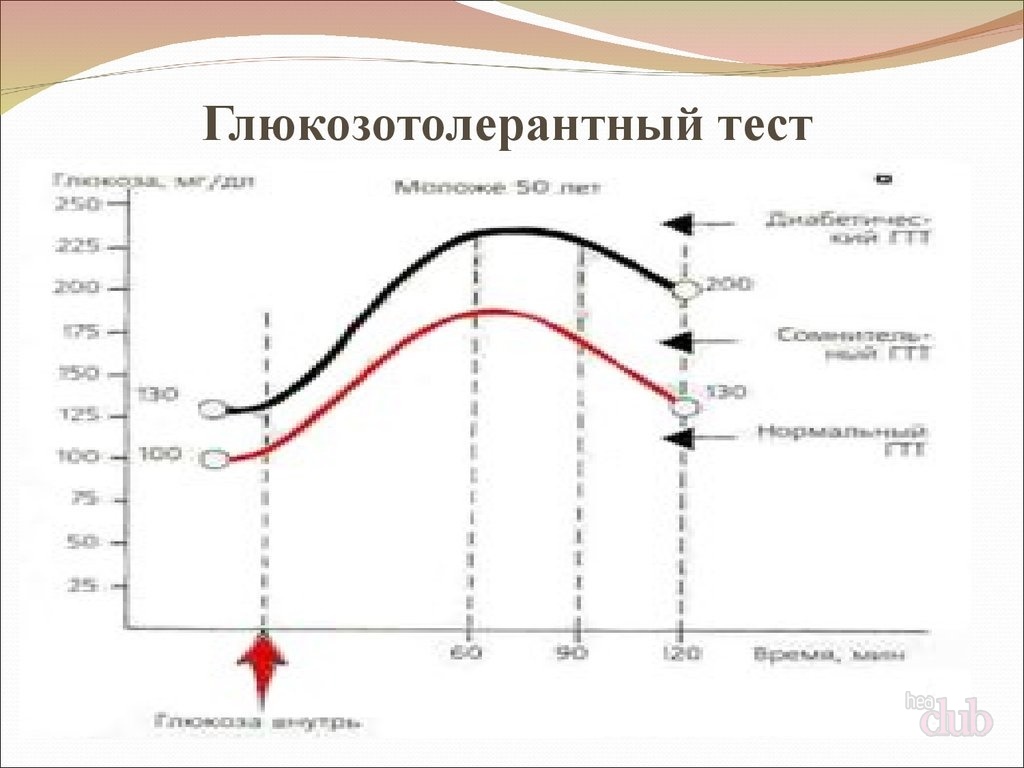 glycemic curves during GTT
glycemic curves during GTT It is advisable to carry out these two tests one after another after 5-10 minutes: first, take blood from your finger on an empty stomach, and then drink glucose and measure your sugar level again.
Last time important analysis is glycated hemoglobin, which shows the % of glucose in relation to red blood cells - blood cells. Using this analysis, it is possible to determine the amount of sugar in the blood over the past 2-3 months.
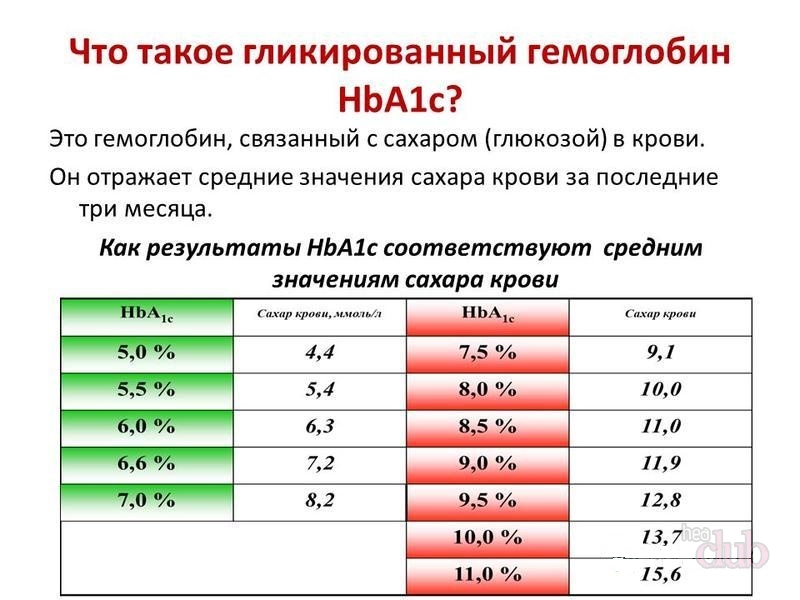 table of correspondence between HbA1c results and average blood sugar values
table of correspondence between HbA1c results and average blood sugar values A glucometer is used at home. The glucometer comes with sterile lancets and special test strips: the lancet is needed to pierce the skin on the tip of your finger and transfer a drop of blood to the test strip. We place the test strip into the device (glucometer) and determine the blood sugar level.
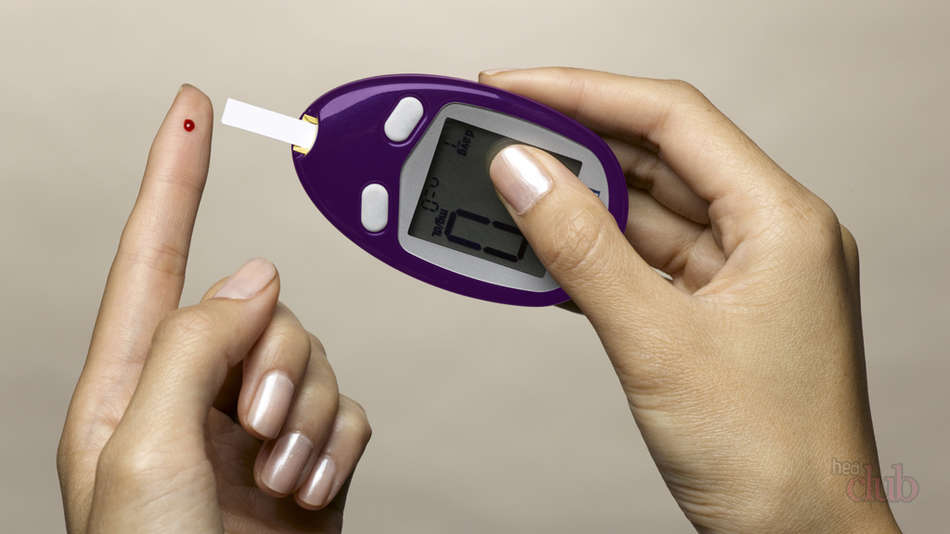 glucometer
glucometer How to prepare for a blood sugar test?
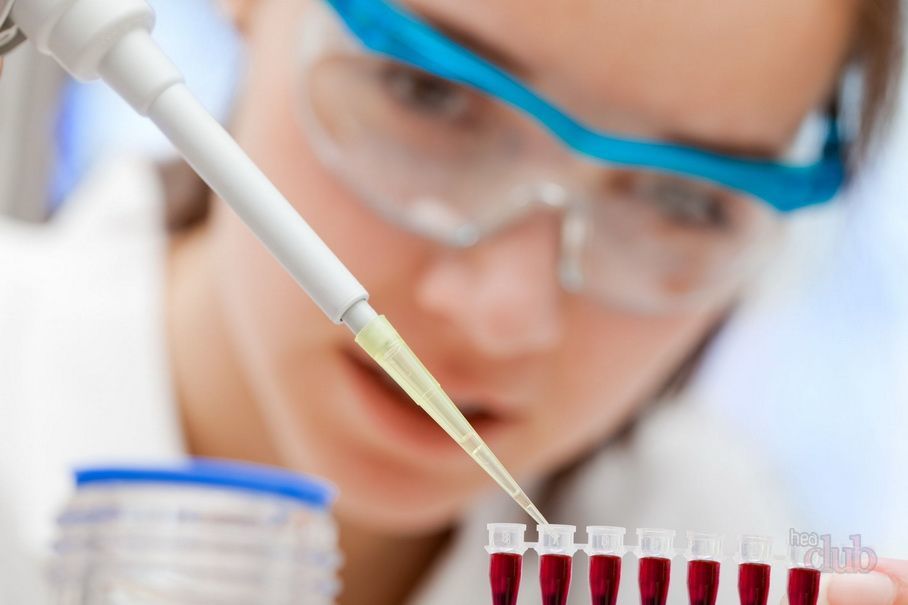 blood analysis
blood analysis To test blood for sugar, you need to remember the following rules:
- Firstly, if we donate blood for analysis in the morning, you do not need to eat in the evening and in the morning before taking the test; secondly, you can drink any liquid
- If we take blood for glycated hemoglobin, it does not need to be taken on an empty stomach
- When using a glucometer at home, blood can be taken for analysis three hours after eating
How to normalize blood glucose levels
 choosing the right diet
choosing the right diet First of all, you need to establish the cause of the increase or decrease in blood sugar, for which you need to consult a doctor who will approach each patient individually.
Some forms of diabetes do not require special treatment To normalize blood sugar, it is enough to set special diet: give up sweets (jam, sweets, pastries), potatoes, pasta, eat more savory foods fresh vegetables and fruits, eat fish, seafood, nuts, soy and bean products, Jerusalem artichoke.
The diet must include plant foods: onions, garlic, beets, carrots, tomatoes, cucumbers, etc.
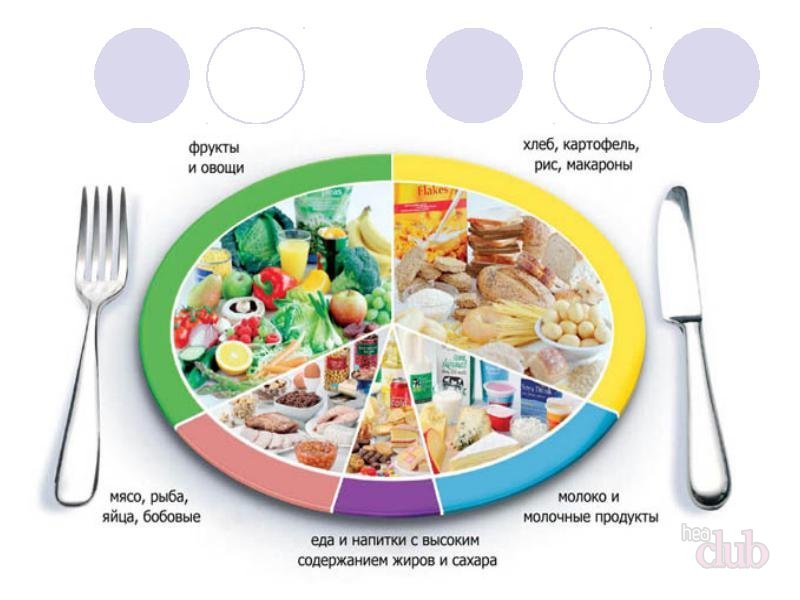 diet to normalize blood sugar
diet to normalize blood sugar You can normalize blood sugar with medicinal herbs, for example, blueberry leaves or berries, bean pods.
In addition to nutrition, you can use other methods to normalize blood glucose levels, for example:
- walks in the open air
- cold and hot shower
- light physical activity, exercises
- regular sleep - at least 8 hours a day
Medicines are also used to normalize blood glucose levels, including insulin.
Treatment for Low Blood Sugar
If your blood sugar is low, you should consult a doctor about therapeutic dose insulin. If your blood sugar drops:
- the patient must use glucose tablets
 glucose
glucose - proper nutrition must be established: it is necessary to consume foods with low glycemic content (seafood, vegetables, dairy products, whole grain bread, etc.)
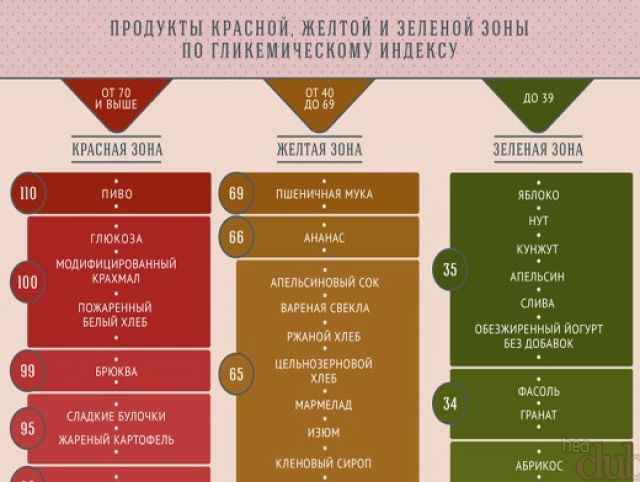 GI indicators in products
GI indicators in products - You need to eat at certain intervals 4-5 times a day so as not to cause hypoglycemia.
Video: symptoms and treatment of low blood sugar
Treating high blood sugar
For a patient with high sugar in the blood you need:
- establish a low-carbohydrate diet: consume no more than 120 grams per day in small portions. carbohydrates, in severe cases of diabetes – 60-80 g. Eliminate all foods containing sugar from your diet and eat 4-5 times a day
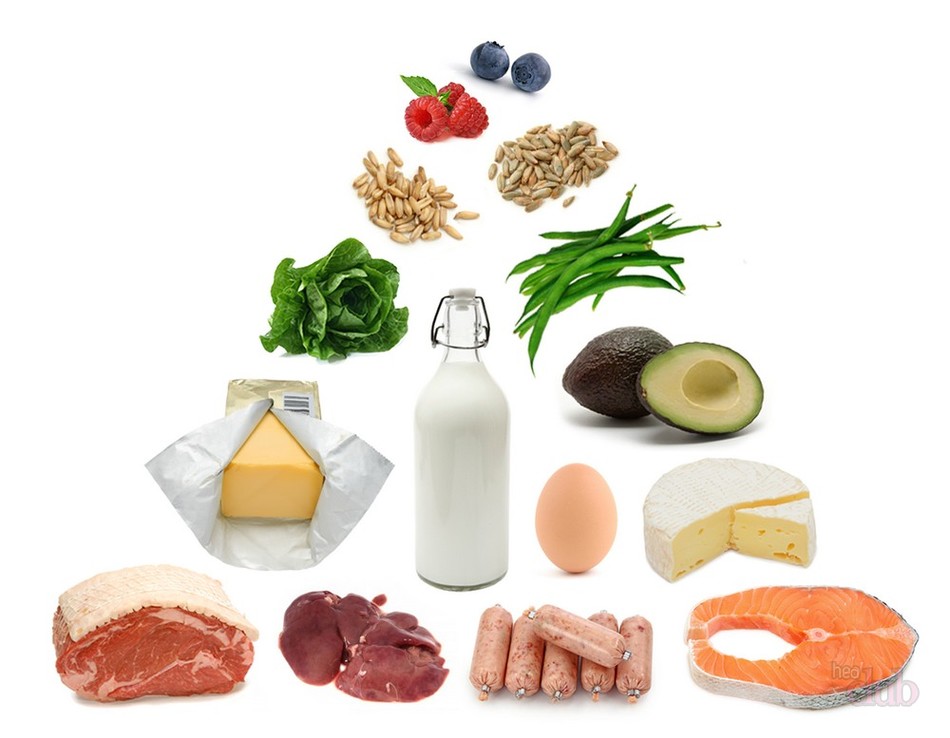 low carb foods
low carb foods - With such a low-carb diet, check your blood sugar more often
- if the patient has constipation with high blood pressure and cramps in the leg muscles, it is necessary to take a multivitamin complex with vitamin C and magnesium
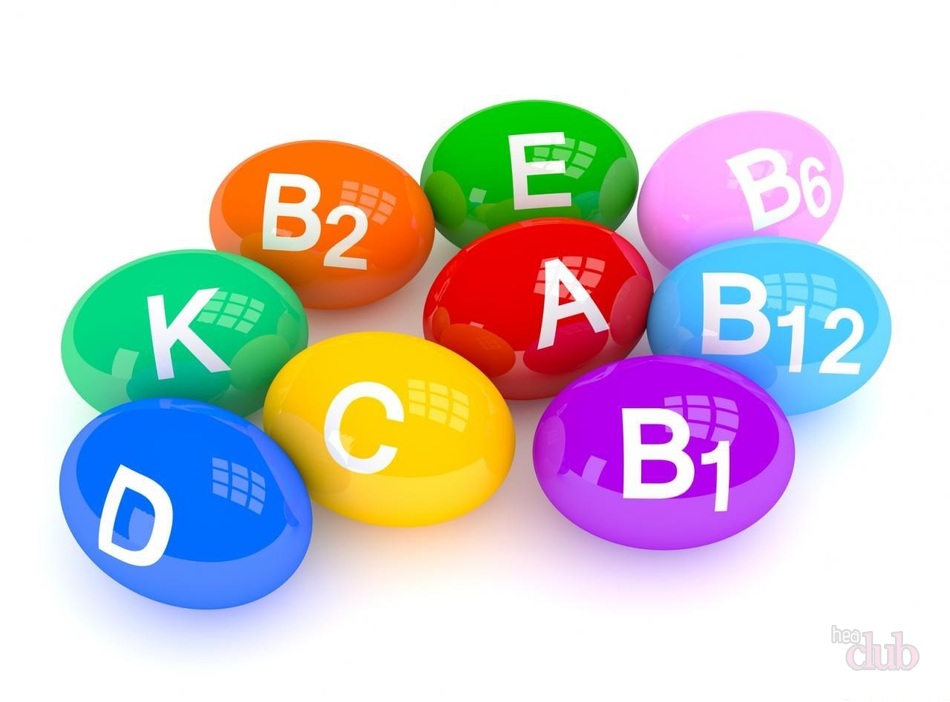 vitamin complex
vitamin complex - used to treat type 2 diabetes mellitus medicines prescribed by the doctor, and insulin
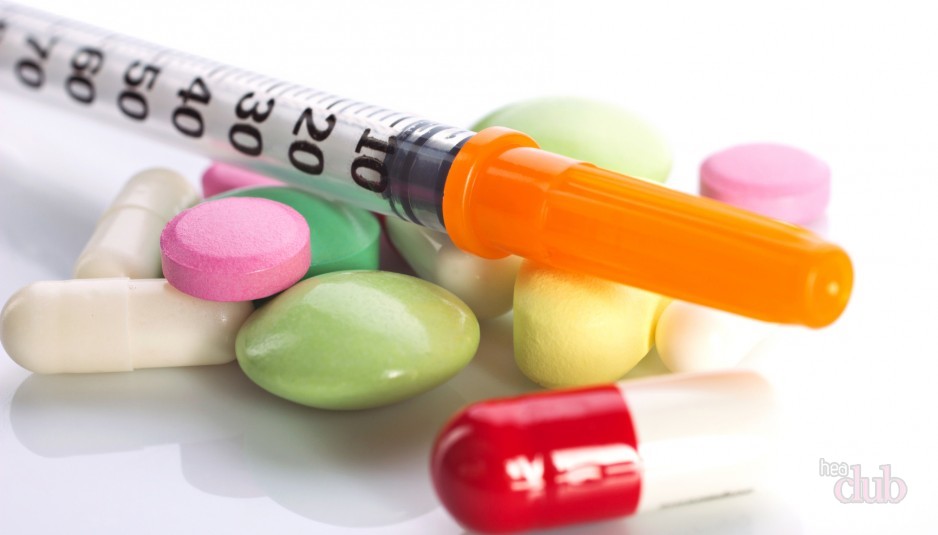 medications
medications - any of the following is useful for reducing sugar large quantities non-carbohydrate liquid, such as leaf or blueberry tea
 blueberry tea
blueberry tea Low blood sugar is characterized by a condition called hypoglycemia. It's pretty dangerous condition the body when glucose is much less than normal and the body needs help. It is worth noting that not only low sugar content is dangerous to health, but also high sugar content. When glucose is low, the body does not receive enough nutrition and the brain suffers first. When the required amount of glucose does not enter the brain, it gradually begins to die. Accordingly, symptoms of malaise and weakness arise.
Causes of low blood sugar
There are reasons for both increases and decreases in blood sugar. Most often this happens due to an unbalanced diet. Those people who know their problems with low glucose always carry candy or chocolate with them. This is a kind of help without the use of various medications. There are several main reasons when sugar drops without any particular reason. This:
- limited and unbalanced diet. This may be a strict diet, when the necessary supply of carbohydrates, which are the main source of energy, runs out;
- too long breaks between meals. For example, when abstaining without food for 8 hours, blood sugar becomes very low, and the body requires renewed energy and the entire necessary amount of carbohydrates for energy;
- constant intense physical activity. This can also happen with regular and proper nutrition, since more energy is consumed than consumed;
- an excess of sweets in the body, since all sweet foods can sharply increase blood glucose, and then there is a sharp drop. Thus, the body also suffers, which can be said about alcoholic drinks.
Low blood sugar - symptoms
The origin of hypoglycemia can be as varied as its symptoms. More often low sugar in the blood is observed in the morning, which is characterized by weakness, drowsiness and possible irritability. If you measure your sugar level with a glucometer, it will most likely be no more than 3.3 mmol/l. In this case, it is enough for a person to eat or drink sweet tea. Then all the symptoms will begin to disappear little by little.
There are also cases of response hypoglycemia, when sugar drops immediately after eating. Such symptoms may indicate the development of diabetes mellitus. There are some symptoms that can accurately characterize the future development of diabetes. This:
- weakness, severe fatigue and irritability;
- increased sweating;
- chills, hot flashes and hand tremors;
- muscle weakness and numbness in the legs;
- strong feeling of hunger and nausea;
- visual impairment in the most advanced cases.
How does low sugar affect the brain?
Since the body suffers completely from a lack of sugar, the brain also experiences its own complications. The patient's condition may deteriorate significantly when the level drops to 3 mmol/l. The patient may experience convulsions, slurred speech, unsteady gait and absent-minded attention. Such conditions usually appear after brain cells begin to die.
If you do not provide assistance to the patient in time, a convulsive attack or loss of consciousness may occur. Low blood sugar may indicate that the body is in a state of malaise. In this case, it is important to prevent diabetic coma because it is extremely dangerous.
Treatment for Low Blood Sugar
 If you already have the first symptoms of low sugar, you need to take immediate action. It is better not to increase low sugar levels on your own, since using inappropriate medications can only cause harm. For this, it is especially important to calculate the correct dose to raise blood glucose. It should be borne in mind that it is necessary to follow a precise diet, a minimum of physical activity and take sugar-lowering medications on your own. Such unfounded methods of treatment can make the blood sugar even lower, because it is not known exactly how this or that drug will affect the body.
If you already have the first symptoms of low sugar, you need to take immediate action. It is better not to increase low sugar levels on your own, since using inappropriate medications can only cause harm. For this, it is especially important to calculate the correct dose to raise blood glucose. It should be borne in mind that it is necessary to follow a precise diet, a minimum of physical activity and take sugar-lowering medications on your own. Such unfounded methods of treatment can make the blood sugar even lower, because it is not known exactly how this or that drug will affect the body.
During the diet, low sugar levels must be raised with the following products:
- various seafood;
- vegetables - tomatoes, cucumbers, zucchini and many others;
- all fermented milk products, especially kefir and fermented baked milk.
If you follow the most simple rules diet, then the treatment will be more than successful and within a short time can be achieved good results. Low blood sugar levels will no longer have a detrimental effect on your body, and most importantly, its levels can always be kept under control. All symptoms will gradually disappear as blood counts return to normal. It is very important to eat right and eat all those necessary foods that are especially important for your body. In such cases, even if sugar decreases, its indicators will not reach a critical level.
Is it possible to lose weight due to low blood sugar?
Many people think that diabetes mellitus, expressed in increased glucose, gives excess weight. Despite this, a lack of sugar can also have a detrimental effect on a person’s weight. But it is worth noting that everything largely depends on individual characteristics every organism.
Most often, symptoms of low sugar occur after physical activity, while the energy reserves of carbohydrates are burned and their replenishment is necessary. If this does not happen, the blood sugar level decreases accordingly. After his promotion natural balance normalization no longer works. Thus, someone may experience the burning of carbohydrates along with salt and fat deposits. And some people with a decrease in sugar experience, on the contrary, weight gain. Many people begin to actively engage in physical activity to lose weight, which especially affects the sharp decrease in glucose. Therefore, it is especially necessary to maintain a balance between nutrition and exercise.

